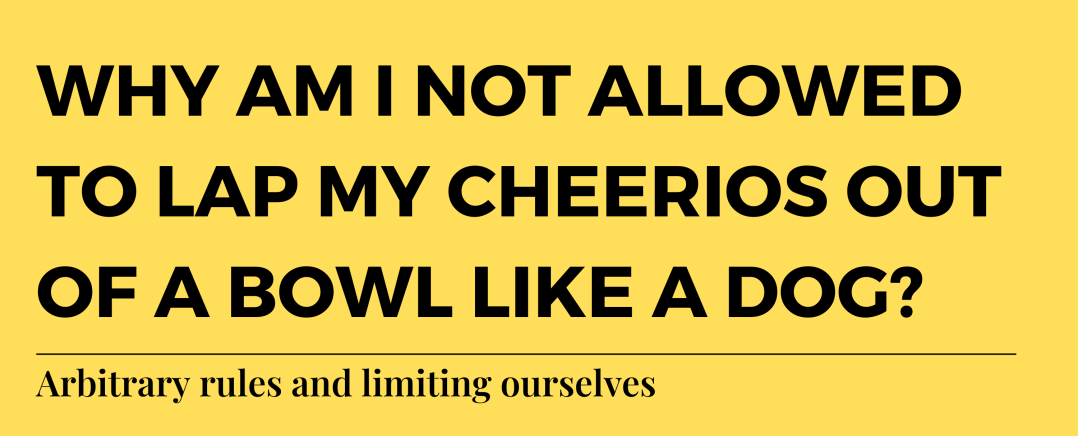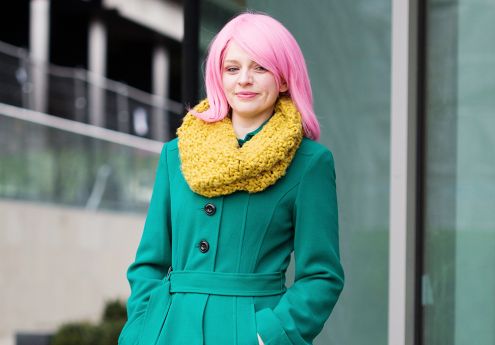Why can’t I lap my Cheerios out of a bowl like a dog? Arbitrary rules and limiting ourselves

On weekends and holidays my son likes to have a bowl of dry cheerios in the lounge while he is watching TV (or in this case, doing a spot the difference) in the morning. On this particular morning, while we are all sat together on the sofa, my son lifts his bowl up to his mouth, pokes his tongue into it – resulting in a coating of cheerios – and then retracts it back into his mouth, chomping away.
Both of us parents laugh and say “Eurgh, don’t do that!” to which he replies:
“Why not?”
We look at each other, and we are both kind of struggling for a good reason. We mumble something about it being impolite and not good manners, to which he says he is not at the table, it’s not making a mess and it’s a fun way to eat. He’s genuinely curious (in the way that five-year-olds are) and ultimately, I don’t have a good reason to say no to him.
So we shrug and we say OK, as long as you know that you don’t do that with most things, to which he says of course he knows.
This really made me think about rules. More specifically: how we sometimes restrict ourselves when perhaps we don’t really need to. In this case, the rule starts out with something useful: it’s good to be mindful about how you eat so that you don’t get food all over the place (particularly the sofa, thank you very much), plus if you can eat reasonably politely (which brings up another set of rules) then you get to have nice social experiences.
However, if this rule about always eating in a certain way is applied with too much rigidity, it can start to become restricting. Why shouldn’t we be allowed to have fun with food? Isn’t that part of what food is all about? Do I want my son to never be allowed to just enjoy himself, mess around a bit, laugh, enjoy what his body can do and the sensations that can come with that? No, I don’t.
This same principle applies with so many other things. Examples I have spoken about before are rules such as:
- “I can have a break when I have finished everything”
- “I can look after myself once I have looked after everybody else”
- “Grown ups don’t play make-believe”
- “Crying is for babies”
- “Finish your dinner before you have pudding.”
- “If you are going to do something, do it properly.”
- “Don’t do anything that would make you centre of attention.”
- “Don’t brag about what you have done – nobody likes a show-off.”
We have rules about everything. What we should wear and when. What and how we eat. What we are allowed to enjoy and when we get to do so. How we are supposed to feel or express ourselves. Whether we are allowed to do something just for the fun of it, or whether we should be trying our best at everything.
Some of them have something useful at the centre of them, but they might just be over-applied. Some of them might be completely arbitrary: things we have been told or taken on board over the years that actually just don’t apply any more or never really made any sense in the first place.
When we aren’t aware of our rules, and particularly when they are too rigid, they can get in our way. They can limit our freedom to choose what we do. That might limit our joy, because we aren’t “allowed” to be silly or do things that bring us pleasure because we haven’t “earned” them. They might even cause us to feel trapped, like we can’t see any viable options, because we have rules about finishing things, not quitting or always making the “sensible” choice.
It can be useful to get to know what rules you tend to live by, and question whether how much they are still serving you or working for you. If they aren’t, then one way to find some greater flexibility is to practise breaking the rules, whatever that might look like. It might be:
- Doing something imperfectly
- Eating your pudding before your dinner
- Turning your phone off even though people might want to reach you
- Having your breakfast as a picnic on the floor
- Not replying to someone straight away even though you normally would
- Talking out loud about your achievements
- Playing an imaginative or messy game
Initially it might feel uncomfortable, but the more you try it, the more you will find that you can tolerate it. The more you can tolerate it, the less you have to think about it and the less restrictive those rules become.
So maybe you don’t have to hesitate so much, maybe you don’t have to overthink your choices.
And maybe you can eat your cheerios with your tongue.
Thanks for reading. Until next time,
Ted
P.S. My daughter came in to my office just now and saw the title of this one. She read it and said “Because you are a grown up and because you are not a dog!” which I think illustrates this point quite nicely. Who says grown ups have to stop doing fun things?
Ted Bradshaw
Cognitive Behavioural Therapist and Coach
My name is Ted Bradshaw (@cbtted on Instagram and TikTok) and my main aim is to make mental health and anxiety in particular much easier to understand. I am a Cognitive Behavioural Therapist accredited by the BABCP and have been working in this area for over 15 years. I am an honorary Assistant Professor of Psychological Therapies at the University of Nottingham and I also work as a coach, accredited by the International Coaching Federation to PCC level. On my first day of training as a therapist, I was immediately annoyed. The things I was learning seemed so useful, and I was confused as to why I had never been taught any of this before, because it would have been so useful. For me, it seemed ridiculous that we would wait until people feel really bad before we offer them any information or insight into how anxiety or how a mind works. That is what led me to look into coaching and it is also why I spend a good deal of my time writing about and making short videos on lots of different aspects of mental health and anxiety in particular. As a parent, I have also found that what I know about anxiety has been so useful to me when dealing with my own children, so a lot of my focus is upon parents understanding anxiety for their children, too. These days in my 1:1 work with enduring mental health issues such as depression. OCD or PTSD, and I also work with people who might not be sure whether it is therapy they need but who are looking to improve something, like confidence or self-esteem. Finally, I also run workshops for schools and businesses on all of these subjects, including how to help an anxious child, good mental health in the workplace and more. You can find me across most social media platforms @cbtted, on Instagram and TikTok in particular.

